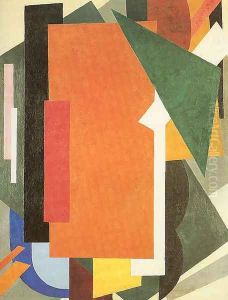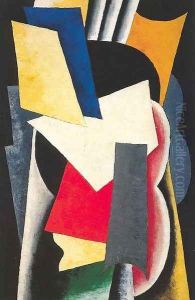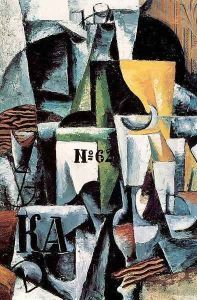Popova Liubov (also known as Lubov or Lyubov) Paintings
Lyubov Sergeyevna Popova was a Russian avant-garde artist, painter, and designer, whose work was deeply embedded in the art movements of the early 20th century. Born on April 24, 1889, in Ivanovskoe, near Moscow, she was exposed to the arts from an early age. Coming from a wealthy family, she had the means to travel and was educated at home by tutors before attending art school. Her early work was influenced by a broad range of artistic styles, including Impressionism and Symbolism, but she is most closely associated with the Constructivist and Suprematist movements.
Popova's artistic journey took her to places like Italy and France, where she was exposed to the latest trends in European art. She studied under Stanislav Zhukovsky before attending the School of Painting, Sculpture, and Architecture in Moscow. In 1912, she met the Cubist painters in Paris and attended the Académie de la Palette in Paris, which shaped her future abstract style. She was particularly influenced by the post-Cubist developments and the works of artists like Pablo Picasso and Jean Metzinger.
By 1914, Popova returned to Russia and started to engage with Russian Futurism, a movement that sought to break away from traditional art forms and celebrate dynamic modernity. She was also influenced by Kazimir Malevich's Suprematist compositions, which were characterized by geometric forms and a limited color palette. Popova's own style evolved to embrace the abstract reduction of forms and a focus on spatial dynamics. She began to experiment with Constructivism after the Russian Revolution of 1917, where art was meant to serve the people and the construction of the new society. Her work from this period is marked by the use of industrial materials, and she often worked on architectural and interior design projects that reflected her avant-garde ideals.
Apart from painting, Popova was also involved in textile and clothing design, theater set design, and teaching. She worked for the First State Textile Printing Works in Moscow, where she applied her artistic principles to fabric designs, making avant-garde art more accessible to the general public. Popova was also a part of 'LEF', a group of artists and writers who endorsed the integration of art and life.
Tragically, Lyubov Popova's life and career were cut short when she died from scarlet fever on May 25, 1924, at the young age of 35. Her work, however, left a lasting mark on the development of Russian avant-garde art. She was celebrated for her innovative explorations of visual language and her commitment to the ideals of Constructivism, which sought to abolish the traditional artistic concern with composition, and replace it with 'construction' that engaged with the real world. Popova's legacy continues to influence artists and designers, and her works are displayed in museums and galleries around the world.


